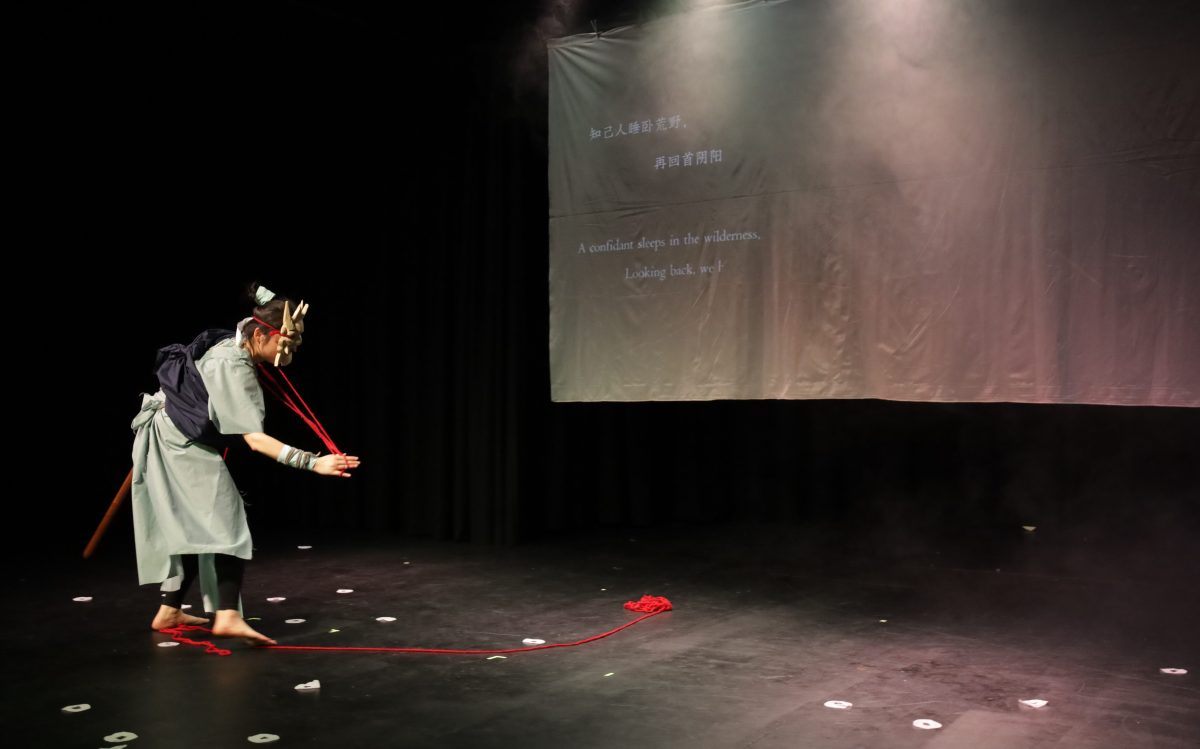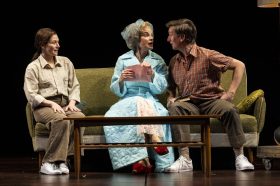Content warning: this review contains shows that reference severe mental health issues, alcoholism and high school pregnancy/abortion.
Love Letters
In what was promised to be a roller coaster tale following childhood sweethearts, Love Letters‘s approach to highlighting themes of growth, love, longing and tragedy was problematic at best, and hard to swallow at worst.
The show featured central protagonists – the spirited and hot-tempered Lisa (played by Angel Xiao) and the stubborn, conservative Li (nicknamed Twig for his lanky figure and played by Fini Liu) – and it was through their letter exchanges that the story unfolded. Beginning in primary school where the characters quickly formed a bond, the bilingual production began completely in Mandarin, with Lisa gradually shifting her delivery to English as a sign of the widening cultural gap between her and Li after she moved to Australia.
Yet, Lisa’s initial excitement towards living in a whole new country quickly triggered a set of misfortunes, from her troubled relationship with her alcoholic mother to being expelled from high school due to pregnancy. Back in China, the increasing burden of academic achievement was placed on Li as he transitioned from primary to high school, alongside family expectations to follow his father’s path as a doctor.
This duality between the “Western way of life” and the “conservative Chinese attitude” was picked up time and time again. For example, Lisa went through a “feminist awakening” after falling out with her high school boyfriend, proclaiming to Li that ‘women don’t need men’ and don’t exist for their pleasure. She continued to blame Li for being outdated in his thinking and this resulted in the first major dispute between the two, where they went without communication for an extended period.
Yet, instead of feeling empowered from her passionate speech, it was met with a dead end as Lisa swiftly became a tender housewife (bearing two daughters and then divorcing) and fussed over her appearance (pushing up her breasts for extra sexual appeal) in anticipation of reuniting with Li later in the show. Of course none of these things are “wrong” in themselves, but when placed against Lisa’s previous proclamation it felt like a win for patriarchy.
We could accept Lisa as a flawed character, but at times in Love Letters, it seemed as if there were no redeeming qualities in her for audiences to feel relatable or even sympathetic towards. She was emotionally immature throughout, often insensitive towards Li’s feelings to the verge of being cruel, and only offered words of comfort in passing before diving back into her own life, troubled by divorce, alcoholism and severe mental health issues. If this was a dating profile, the girl would be all red flags.
Li also went through his fair share of twists and turns, from family illness to lack of self-esteem, but came to achieve success as a government official later in life with a happy nuclear family (albeit in appearance). His longing for Lisa and her free-spirited approach to life only strengthened as time passed, as he promised to be with her wherever she was in the world when his own marriage was on the verge of collapse.
Both Xiao and Liu were clearly committed to their roles, and Li’s devastation at a pivotal moment was gut-wrenching. But the dialogue soon felt dry and manufactured. The simple stage set-up meant almost everything depended on the performers’ expressions, speeches and movement, interspersed with equally generic lighting and music choices.
Love Letters ended with a montage of what life between the two could’ve been like if Lisa hadn’t moved to Australia – dating in uni, a happy marriage, kids and retirement … as if all the troubles would have gone away. Perhaps nothing other than a romanticised fantasy, this inevitably felt like putting the blame on immigration. We all know moving to a foreign country can trigger cultural shock, intergenerational trauma, loneliness and assimilation, but the show didn’t seem to want to address any of these issues seriously. Instead, it opted for melodrama and sexual desires that seem to have manifested out of thin air.
It was upsetting to see a diaspora retell take the wrong turn(s) and continue to perpetuate “shock value” without understanding the nuances of love, loss and trauma that may come with separation.
★★
Love Letters presented by Do Theatre, adapted from Shan Cheng Ju’s Shou Xin Kuai Le (You’ve got mail!)
Director: Fini Liu
Producer: Sally Chen
Performers: Fini Liu and Angel Xiao
Love Letters was performed from 11-22 October at Festival Hub: Trades Hall Old Council Chambers.
A friendship of life and death
Running for one show only at the MC Showroom, A friendship of life and death sought to blend traditional Chinese stagecraft with contemporary storytelling. It made a big claim of being the ‘first ever Chinese opera physical theatre piece to be presented in Australia’, yet sadly failed to deliver in multiple aspects, making the show feel amateur and under-prepared.
A friendship of life and death followed the story of an unlikely encounter between a swordsman and a traveller, where they banded together to complete a “mysterious” quest (from what was presented to the audience, the path and aim of the quest was seriously unclear). Danger and sacrifice were around every turn on this treacherous journey, only for the characters to uncover that the “treasure” was not what it seemed.
With no dialogue between the performers, the show’s narrative relied heavily on music, traditional Chinese poetry/songlines and projections. While guest Chinese opera artist Rui Chen opened the show with his captivating voice and suggested great promise for what was to follow, he was absent from the rest of the performance and only returned to the stage for the finale. Musicians John O’Beirne on the guitar and Alice Zhao on the pipa played harmoniously throughout the show, but the rhythm did get repetitive without a clear crescendo. Live musical numbers were interspersed with recordings, yet it was unclear why this decision was made when it detracted from overall audience engagement.
The same went for the projections. Technical glitches aside, the inclusion of stock image visuals – a roaring tiger and what appeared to be a gif of a Chinese emperor – were distractions from the performance. At one point a video showing smoke from burning incense was projected onto the thin curtain, when a few scenes prior a smoke machine had been used.
While the actors felt sincere in their performance of the respective roles – and acknowledging the challenges of a small ensemble – stage presence was, overall, lacking. Playing multiple secondary roles in the show was Andy Li, who actually showed potential in his physicality as the demon battling with the swordsman (Olivia Wang) and traveller (John O’Beirne) in the second half of the show. Li’s talent could have been better utilised, perhaps as the threatening tiger with some simple props and makeup, rather than opting for an awkward projection.
Hiccups throughout the show, including retrieving props accidentally left on stage and leaving backstage curtains partially open, suggested unfamiliarity with the venue and perhaps the absence of a dress rehearsal.
While presented with good intention and bold ambition, A friendship of life and death needed to undergo serious development to enlarge its strengths and smooth out its creases.
★★
A friendship of life and death presented by Cross Encounters
Producer: Olivia Wang
Dramaturg: Kira Zhang
Guest Chinese Opera Artist: Rui Chen
Composers/Live Musicians: John O’Beirne, Alice Zhao
Performers: Michael Whitmore, Olivia Wang, Andy Li
Lighting/Multimedia/Costume Designer: Zena Wang
Sound designer: Ray Xin
A friendship of life and death was performed on 22 October at the MC Showroom; free.





